Astghik smiles at us as she stands in the yard of Yerevan State University. Behind her smile lies strength and excitement for she knows the conversation will not be easy. Yet she is convinced that this story must be told.
Starting life from scratch three times
21-year-old Astghik Babayan is from Artsakh (Nagorno-Karabakh), specifically from the village Nor Aygestan in Martakert region. This village has been the last “main” address for her and her family. Since 1992, the family has been displaced three times.
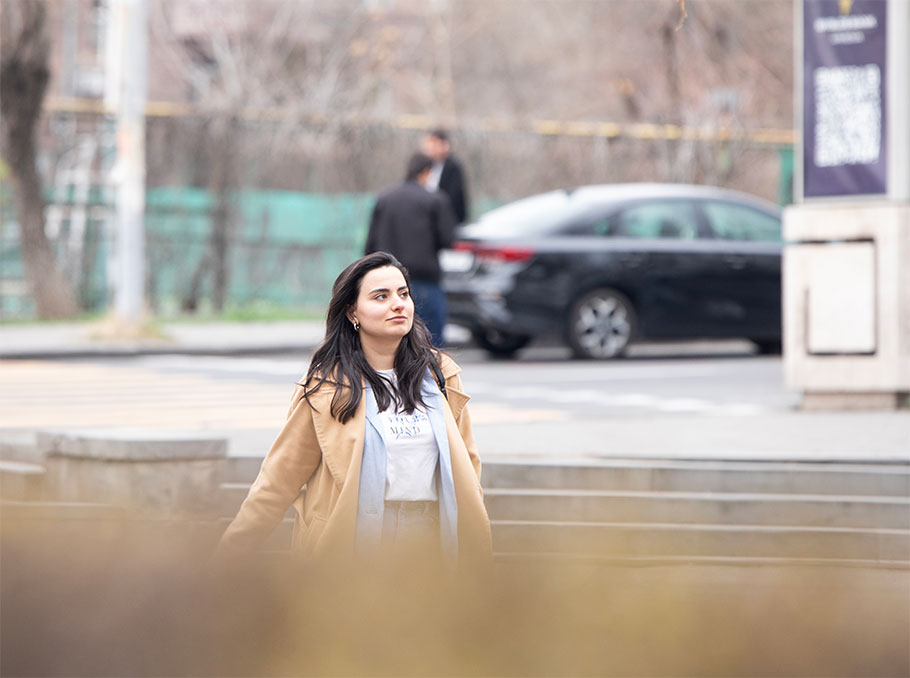 Astghik Babayan in the yard of YSU
Astghik Babayan in the yard of YSUPhoto: Mediamax
“My father was born in Aygestan (Chaylu) village. During the first Artsakh war, the village fell under the Azerbaijani control, prompting my father’s family to abandon everything and seek refuge in another nearby community of the region, Nerkin Horatagh. It was in Nerkin Horatagh where I was born and attended school. When I was in the sixth grade, my family got a house in Nor Aygestan, a community established for displaced people from Aygestan. Here, I continued my education and in 2020, I graduated from school and enrolled in the law department of the Faculty of History and Law at the Artsakh State University in Stepanakert,” Astghik tells.
After the second Artsakh war, 193 communities of Artsakh, including Astghik’s hometown of Nor Aygestan, have been handed over to the Azerbaijani side by the agreement signed on November 9:
“My family was displaced for the second time. We settled in Stepanakert from 2021, trying to rebuild our lives from scratch once again. However, this lasted for 2 years. Following Azerbaijan’s attack in September 2023, Artsakh was left without Armenians. This was our third displacement.”
Along with more than 100,000 displaced residents of Artsakh, Astghik’s family moved to the Republic of Armenia, settling in the Charentsavan community:
“In our family of four sisters, I’m the eldest. Two of us are students, the other two are still in school. In Artsakh, my mother worked at a village school, my father was a military. When our village was handed over and we moved to Stepanakert, my mother started baking and selling pastries. Unfortunately, this did not last long due to the blockade.”
After moving to Armenia, Astghik’s mother resumes her favorite work, setting up a small confectionery production in Charentsavan. With her father’s assistance they embark on this endeavor, while Astghik and her sister, two years her junior, continue their education at universities in Yerevan. Every day they come to the capital from Charentsavan to attend the classes:
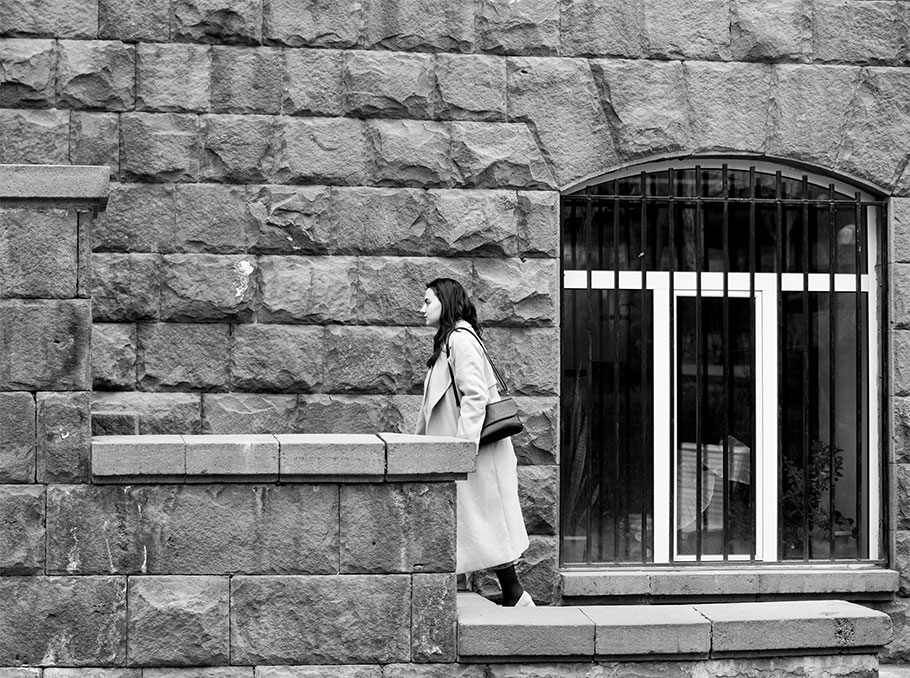 Astghik Babayan at the entrance of YSU Faculty of Law
Astghik Babayan at the entrance of YSU Faculty of LawPhoto: Mediamax
“Education is very important for me. Just days after our displacement, after losing everything, I found myself at Yerevan State University. I wanted to understand how I could move as quickly as possible. I studied at Artsakh State University for three years, but that university ceased to exist in one day. We were warmly received at YSU and the faculty which supported us in all possible issues. They say that student life is the most carefree and happy period in one’s journey. Yet, throughout my three years as a student, every possible disaster happened. My freshman year was marked by a war, followed by the challenges of post-war period. My third year passed under the conditions of a blockade, then another war and displacement from Artsakh.”
“Who, if not us?” - Liza from Ukraine wants to return to her homeland
“I am in eleventh grade. I was in seventh grade when I had my last lesson in the classroom.
Since then, I have only seen my classmates and teachers on the screen during online classes. I feel like someone has taken away the best years of my youth. We have been locked at home for two years due to COVID. Then the war began, and no one knows when it will end.”
This is the story of 16-year-old Liza, who left Ukraine with her mother shortly after the start of the full-scale war and moved to Batumi.
She does not know if she will have a graduation ceremony, or if she will see her classmates again, but she is certain about where she will continue her studies - in Ukraine.
Many Ukrainian universities have resumed the educational process, and remote learning is an option, but Liza wants to return to Ukraine and continue her studies there:
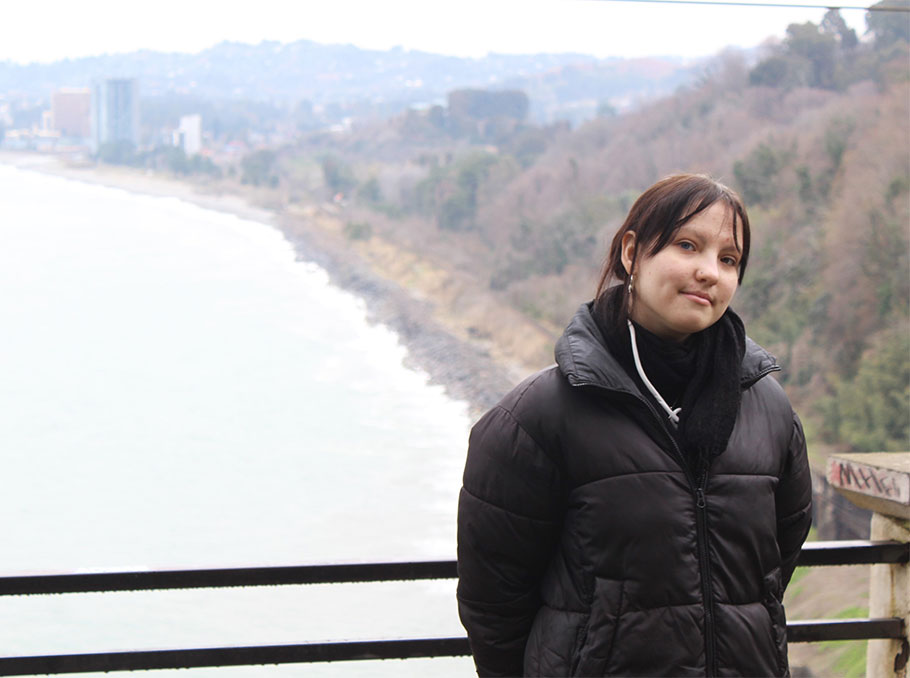 Liza in Batumi Botanical Garden
Liza in Batumi Botanical GardenPhoto: Batumelebi
“Obviously, the country’s economy is in a terrible state, even after the war ends, the process of the country’s recovery will be long and difficult, but it is precisely in tough times that I want to help Ukraine, which raised me, which stands against such a war.
Sometimes I ask myself: who, if not us, will return to Ukraine, who, if not us, will rebuild this country after the war? I want to study and work in Ukraine; I see my future there,” says the 16-year-old girl.
Liza is interested in filmmaking - video shooting and editing. In her free time, she takes photos with her phone and experiments with various software for artistic editing. She never even considered studying film production in English in Georgia because for foreign citizens, such programs are quite expensive there.
“I was preparing for written work amidst the sound of explosions”
Astghik’s first September as a student lasted only 27 days:
“On September 27, Azerbaijan initiated a large-scale war against Artsakh, abruptly halting the beginning of happy student life. I remember my first reaction was denial. On September 28, an important written work was assigned at the university, and even as explosions rang out, seeking refuge in the basement, I clung to my textbooks. I held onto the hope that everything would be fine, the war would be over in a few hours, and I would go to class tomorrow as usual. The war lasted 44 days. Peaceful settlements and civil infrastructure were also shelled, compelling women and children to flee Artsakh temporarily. Alongside my mother and sisters, I came to Armenia. My father naturally stayed at the border.
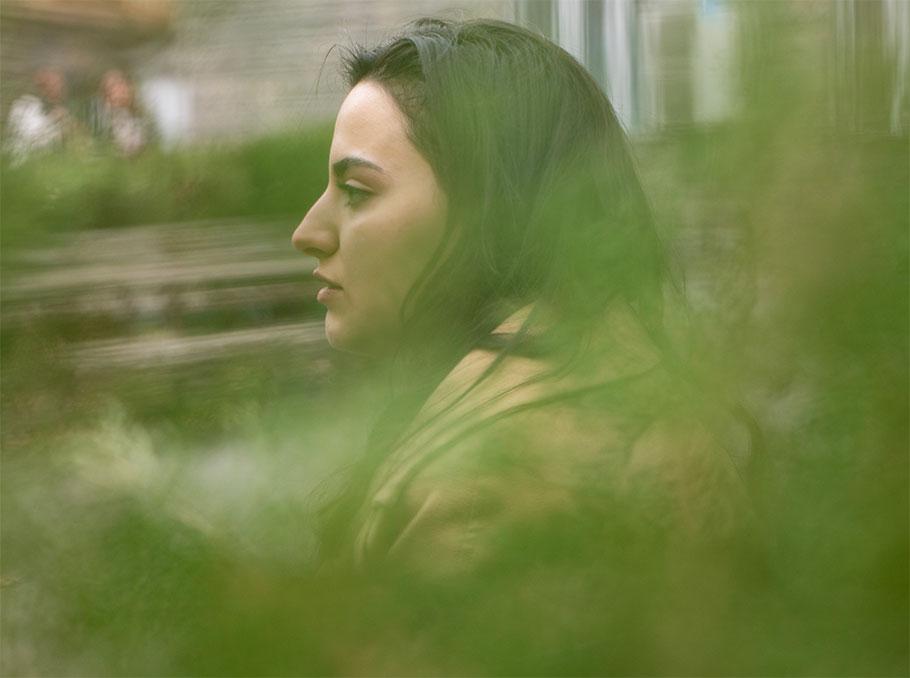 Astghik Babayan at YSU yard
Astghik Babayan at YSU yardPhoto: Mediamax
We returned to Artsakh in summer of 2021. We lost our home because Nor Aygestan was handed over to Azerbaijan. We spent the summer with my grandparents, and in September we rented a house in Stepanakert and started rebuilding our lives,” says Astghik.
The first missile attack
Liza remembers the first explosion near her house, marking the start of the war. On February 24th, she dressed up, grabbed her bag, and was about to head to school when her mother said,
“You can’t go to school, the war has started, Russia has attacked us.” Liza took off her jacket, put her bag down, and sat.
They didn’t turn on the lights at night, fearing they would become an easy target for Russian planes. They were relieved that they had managed to bring their grandmother to their home, facing the danger together.
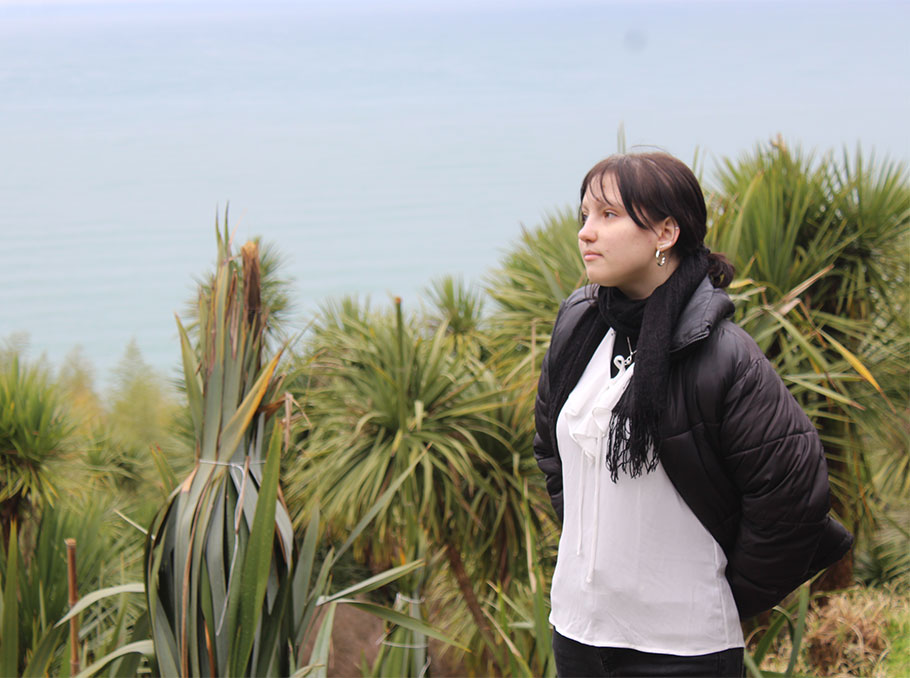 Liza in Batumi Botanical Garden
Liza in Batumi Botanical GardenPhoto: Batumelebi
When the first explosion ripped through, she and her grandmother sat on the couch, hugged their dogs, and covered themselves with a blanket over their heads.
She recalls that such self-protection seemed both sad and funny at the same time.
“What’s the use of a blanket over your head during bombing? But we acted instinctively. We thought it would protect us and our dogs. When we realized this, we laughed under the blanket,” Liza remembers.
March 1 is her birthday. On February 24, the girl dreamed that the war would end soon and she would celebrate its end and her birthday with friends. But the shelling continued.
Liza and her mother decided to leave Odessa only after the Russian army began to target schools.
Blockade of Artsakh
“On December 12, 2022, when the siege of Artsakh by Azerbaijan began, I broke my leg and was moving on crutches. I used taxis and did not miss classes,” recalls Astghik.
As the days passed, fuel reserves ran out, and what remained was kept for emergencies. First, the taxis stopped working, then the buses coming from the inner city and regions ceased operation:
“I had to miss classes because I simply could not physically make it to the university. During the second semester, when my leg healed relatively well, I walked to campus, despite residing on the other side of the town. I was still lucky as many students from the regions could not reach Stepanakert. My friend was from the city of Askeran (about 15 km away from Stepanakert-ed.) and could not attend classes during the siege. There was one electric car in Askeran and it was her only chance to get to the university. Often, during important lessons, she was called and told that the car was going back to Askeran and if she wanted to get home, she had to leave immediately. Witnessing a diligent student, passionate about her studies and profession, caught in such circumstances was deeply painful,” says Astghik.
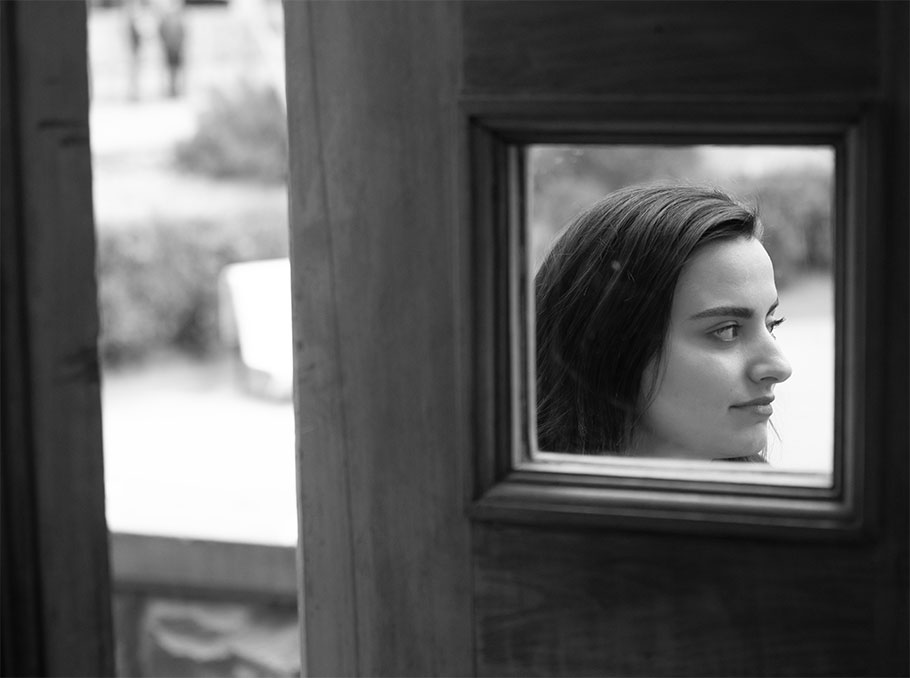 Astghik Babayan at YSU Faculty of Law
Astghik Babayan at YSU Faculty of LawPhoto: Mediamax
Daily power and gas outages significantly disrupted the educational process:
“We sent educational materials to our classmates in the regions, but with the limited availability of electricity, they often could not even open or read them. It is difficult to imagine, but many of them lacked even the most basic food at home,” Astghik remarks, her gaze falling.
During the blockade, informal education also became impossible. The students of Artsakh State University won the international humanitarian law trials held in the Republic of Armenia for several years in a row. In February 2023, they were to go to Albania to participate in the Jean Pictet international trial, but they could not due to the blockade.
What prevents Ukrainian applicants from continuing their education in Georgian universities?
Twenty Ukrainian students are enrolled in the 11th grade at Batumi Public School No. 20. Some of them say that returning to Ukraine is dangerous, despite the fact that some universities have resumed the educational process. Therefore, they plan to continue their education in Poland or Slovakia - Slovak and Polish languages belong to the Slavic language family, they are very similar to Ukrainian, and the applicants say that it is possible to learn these languages to a level sufficient for university studies within a year.
Ukrainian citizens seeking to study Georgian language programs in Georgia, must attain B2 proficiency level in Georgian. On these terms, a foreign applicant can be admitted to entrance exams, although, in reality, even with such a level of language proficiency, studying all university subjects in Georgian is quite difficult. State universities offer a one-year preparatory course in Georgian, but for foreign citizens, this course is fee-based.
Some Ukrainian graduates living in Batumi say they can study in English-language programs, although Georgian universities offer English-language programs in only a few faculties. Therefore, when choosing a profession, Ukrainian applicants in Georgia have a limited selection.
At Batumi State University, an English-language program is available only in the medical field, however, as Marine Giorgadze, the head of the department for Strategic Development and External Relations at the university, told “Batumelebi”, one student from Ukraine is studying at the faculty of Turkology, two at the faculty of Slavic Philology, and one in the English-language medical faculty (as of March 2024).
Preparing for entrance exams
As a military refugee, Liza has to do a lot remotely, she studies with tutors online and attends school classes online. She also communicates with her grandmother, who stayed in Ukraine.
“Everything got more complicated, last year at the university entrance exams only three subjects were required, now there are four. A full history of Ukraine has been added as a compulsory subject. I need a tutor for two subjects: history and mathematics, for which I, of course, pay money, my father helps me with it.”
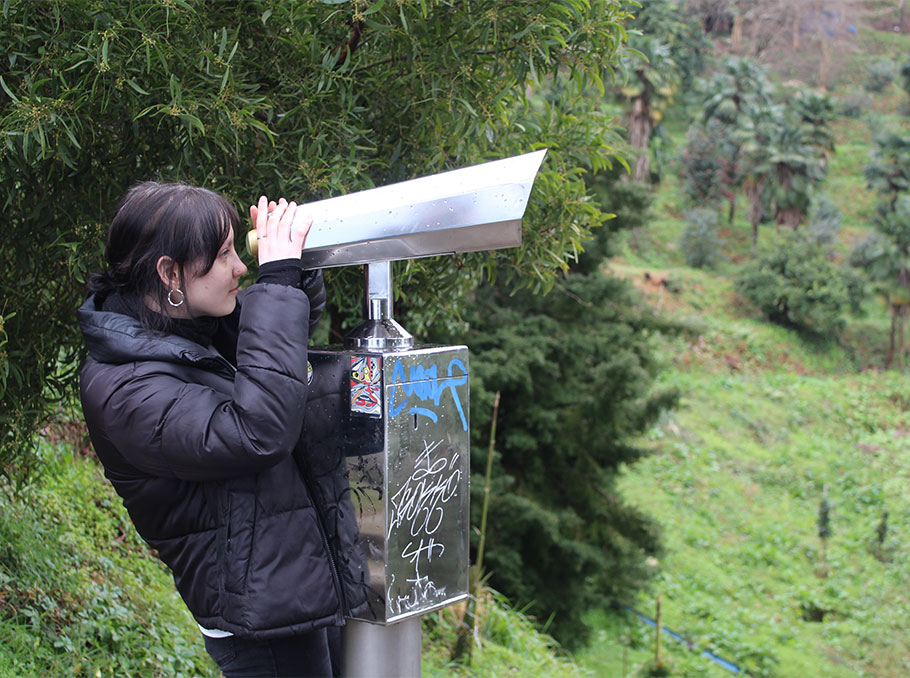 Liza in Batumi Botanical Garden
Liza in Batumi Botanical GardenPhoto: Batumelebi
To pay for the apartment rent in Batumi and provide for the family from month to month, Liza’s mother has to work very hard. She is a dentist. Before the war, she worked in a dental clinic in Odessa. In Georgia, she started working at one of the public organizations:
“My mother has a hearing impairment. She is an educated person, she had her own business in Ukraine, and the diagnosis did not interfere with her work there, but in Georgia, you need to know Georgian everywhere, which is a significant barrier for her. Here she cannot afford the luxury of working as a dentist. It’s hard to provide for oneself in Georgia, and products here are very expensive compared to prices in Ukraine,” says Liza.
“We left Artsakh on September 25, my birthday”
Astghik’s graduation, September of the fourth year lasted 19 days. On September 19, 2023 Azerbaijan launched another large-scale war against Artsakh, the second within a span of three years:
“One of my lecturers offered me a job at the court. On the morning of September 19 I went to discuss the details. After the appointment, I arrived at the university feeling happy. The first class was to start at 13:10 p.m., but at 13:06 p.m. we heard the first explosion. The alarm went off in the university and we all went down to the basement. I stayed there until the next day, as it was very dangerous to go out and run home.”
As the first explosions rocked the area, Internet and telephone connections were cut off in Artsakh. Astghik recalls the terrible situation in the basement, where students, professors and the neighboring school students could not contact their families. People were crying, they were very scared and even fainted. After living under siege for nearly a year without access to essential supplies like food and medicine, the war was a devastating final blow.
“My mother found me the next day. I will never forget that meeting,” Astghik gets excited, we sit in silence:
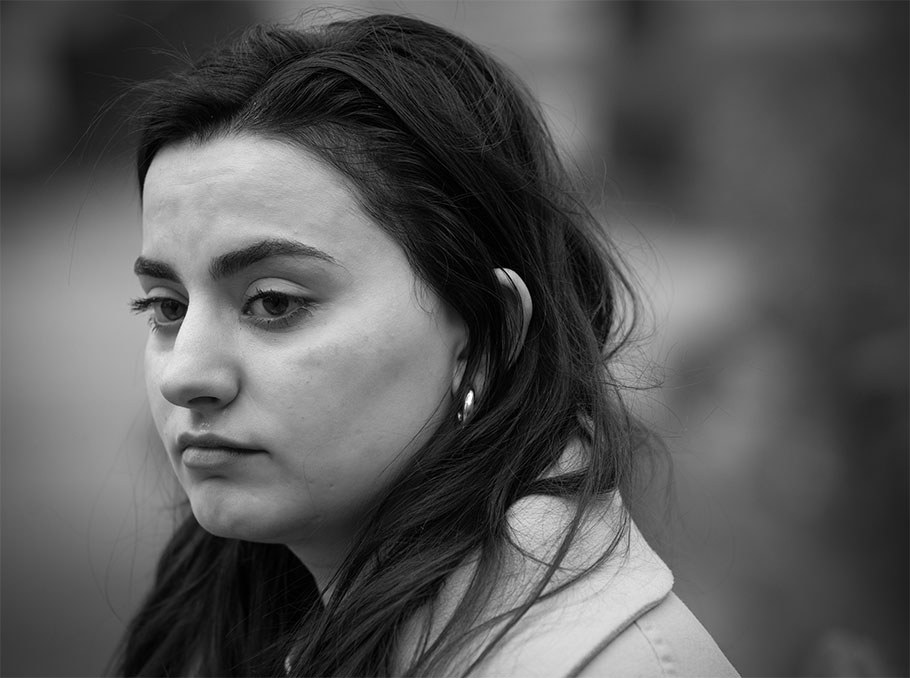 Astghik Babayan
Astghik BabayanPhoto: Mediamax
“My elder sister was already a student, studying in Yerevan. The other sister was also with her. In Stepanakert, it was just my mother, my school-aged sister, and me. My father was in positions and we did not hear from him at all. I spent the whole night in the university basement thinking about my little sister. I wondered where she was during the first explosions - on the street, at school, did someone help her to safety? Later I learned that my mother found her on the street, the most dangerous place at that moment. Only after making sure that everything was okay with my sister did my mother notice that she ran out of the house barefoot.
After the military operations ended, we went home. We did not collect our belongings, we did not even confess to each other that we should leave Artsakh. Throughout this time, we had not heard a word from dad. A few days later he called and said he was coming. We left Artsakh on September 25, my birthday.”
“It’s hard for me to communicate with people”
Liza says that four years away from her homeland and friends have completely changed her life and habits. She hardly ever leaves the house, only when necessary. She dreams of at least attending the school graduation but does not know if she will be able to come to Ukraine by that time:
“I feel as if someone locked me up and took away my school years. I lost the best years. My mother and I live in Batumi. Sometimes I see no reason to leave the house. The war has lowered my social skills, and I find it hard to communicate with people. I know that this war has terribly affected Ukrainians, we still do not know what traumas this attack has inflicted on my people. It has affected me so much,” says Liza.
In Ukraine, Liza was engaged in athletics and boxing. Now her favorite activity is walking in the Batumi Botanical Garden, which reminds her of the botanical garden in her hometown of Odessa. Liza’s grandfather worked at the Odessa Botanical Garden.
She spent all her childhood in this garden, which, like the Batumi Botanical Garden, is located by the sea.
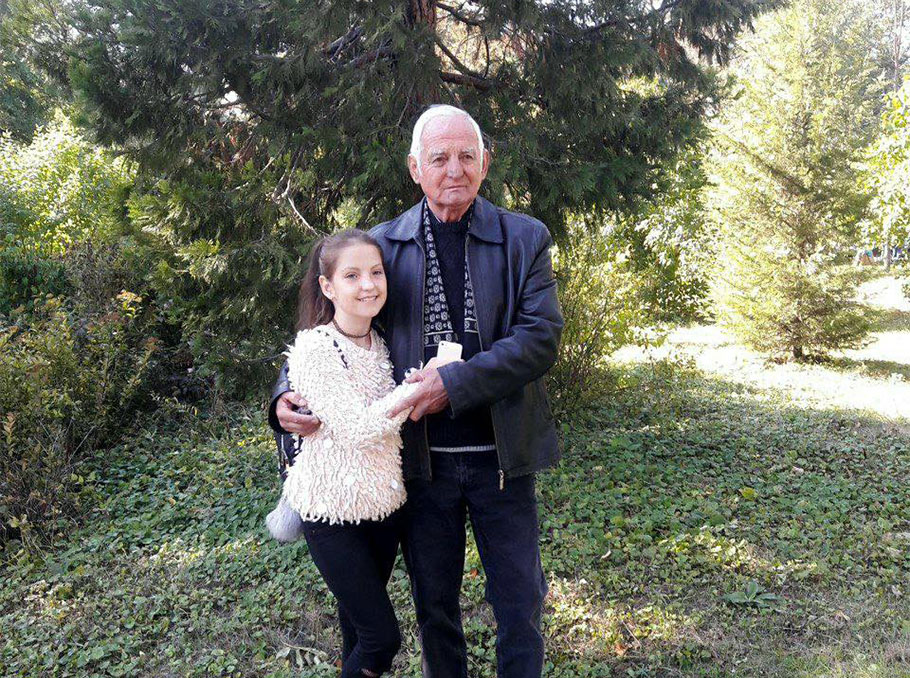 Liza and her grandfather in Odessa Botanical Garden
Liza and her grandfather in Odessa Botanical GardenPhoto: Batumelebi
Liza often walks on the beach in Batumi, looks at the Black Sea, and remembers her childhood city:
“Somewhere there, on the other side of the sea, is Odessa, my sandy beaches, friends, school, my relatives, grandmother. And, of course, it reminds me of sunny Odessa and peaceful days.”
Liza’s classmates from Ukraine save her from the feeling of isolation. This year they started studying in classes. They call often, tell school stories, cheer her up, and try to tell her about everything that happens:
“My classmates live in conditions of war, constant alarm, and yet they find the time to call me, cheer me up, and happily share school news with me, as if we are still living in those carefree times. They tell me what they laughed at, what made them angry... It means so much to me, they are so sweet. Living under the conditions of war, they still think of me, so I don’t feel lonely and alienated,” says the eleventh-grade student.
“No one will tell about this better than us”
Astghik only brought her books from her student life in Artsakh:
“I knew we did not have much space, but my uncle said, ‘Take your books, I will bring them myself.’ Of course, we also keep in touch with our classmates. Many, like me, continue their education at YSU Faculty of Law. Currently, I am professionally engaged and working on my thesis. I will be graduating from Yerevan State University this year,” says Astghik and adds with a smile “maybe.”
Like in Stepanakert, in Yerevan, she continues her volunteer efforts in an organization carrying out a fact-finding mission regarding the wars and displacement in Artsakh:
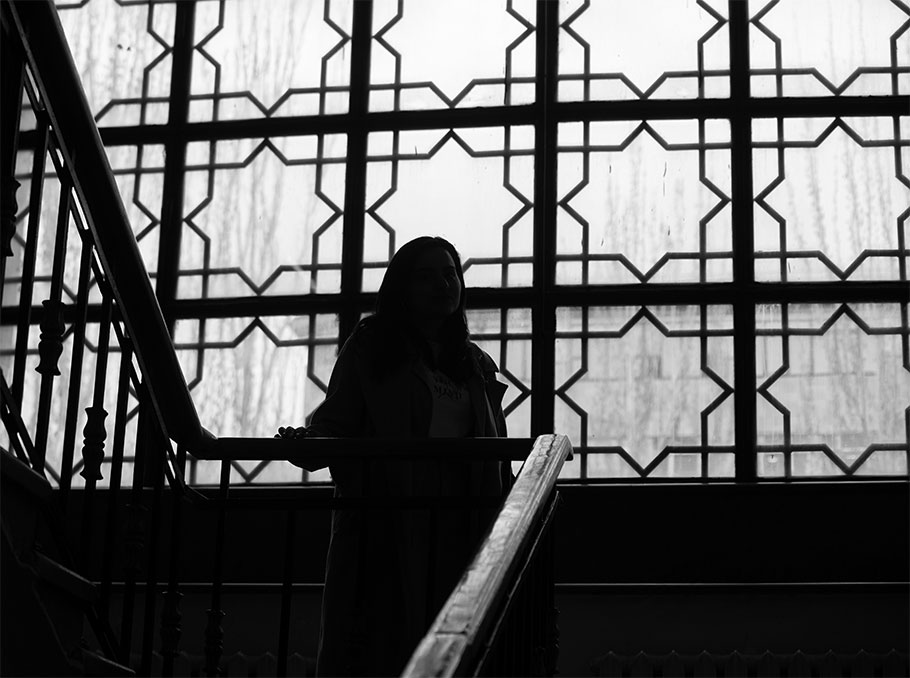 Astghik Babayan
Astghik BabayanPhoto: Mediamax
“We meet with the affected families, talk and collect their stories. It is very difficult to hear and relive what you have yourself gone through. All the stories are yours, they happened with your family as well. But I think this is important. The hardships that my peers and I have gone through should strengthen us. After all, no one better than us will be able to convey these stories to people and the world.”
As of February 2024, 2116 forcibly displaced students from universities of Nagorno-Karabakh settled in the Republic of Armenia. 1,897 of them are continuing their education in relevant or related educational programs of different universities of Armenia.
“War is not something we should accept; war must end.”
They left Odessa in the summer of 2022. Liza’s mother told her they would go to Batumi for just a month to relax by the sea and then return. Liza didn’t say goodbye to anyone, not to her classmates, friends, or her boxing coach.
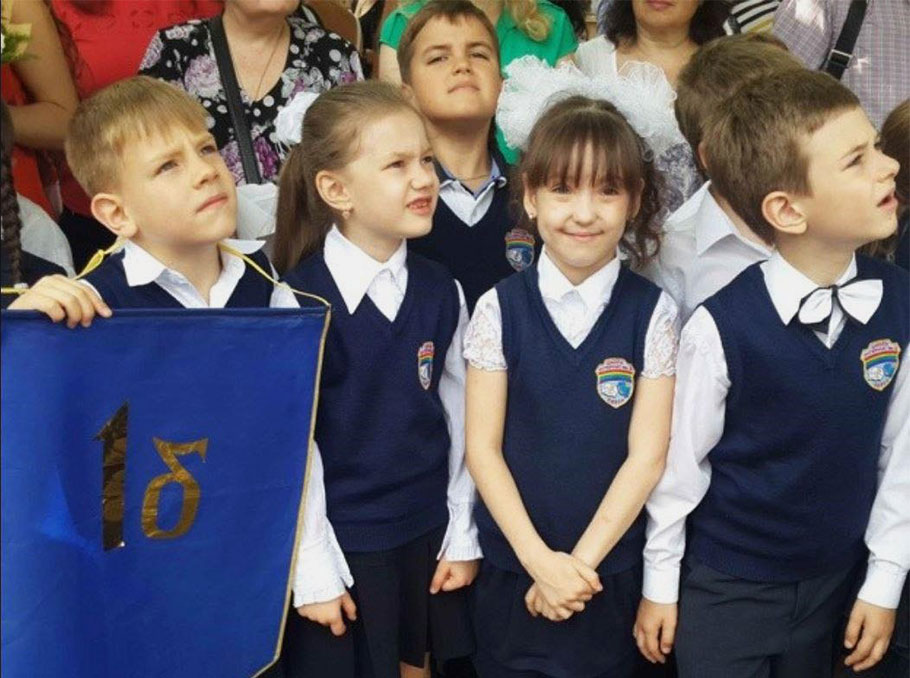 Liza with her classmates in Odessa
Liza with her classmates in Odessa
“Why are we leaving Ukraine if the war is going to end in a month? Let’s stay and wait!” Liza tried to convince her mom to stay. “We’ll see what the beaches in Batumi are like, how people live there, and then we’ll come back,” her mother said.
“Grandma didn’t leave Odessa. My mother and I left. I was in ninth grade then. The whole way, I slept on my mother’s lap, barely ate anything, didn’t want to say goodbye to the city, didn’t even want to open my eyes. It was my form of protest. I felt we were leaving Odessa for a long time, but I didn’t want to believe it. The journey was long and endless,” remembers Liza.
Two years have passed since those days. Liza’s mother no longer tells her the comforting lie that “the war will end in another month.” Both know there is no end in sight to the war.
“I often talk to my grandmother and friends through video calls. It’s as if they’ve gotten used to the war because they’re tired of the stress. The mind cannot live in constant tension; it adapts to reality as if everything is normal. This is not normal. War is not something we should accept; war must end,” says the 16-year-old girl.
The project was implemented by Mediamax and Batumelebi&Netgazet, with the financial support of the Media Initiatives Center within the framework of the “Creation of Independent Media Content” grant program.
Authors: Yana Shakhramanyan, Tamar Nergadze
Videos: Gayane Yenokyan, Eka Beridze
Photos: Agape Grigoryan, Tamar Nergadze
















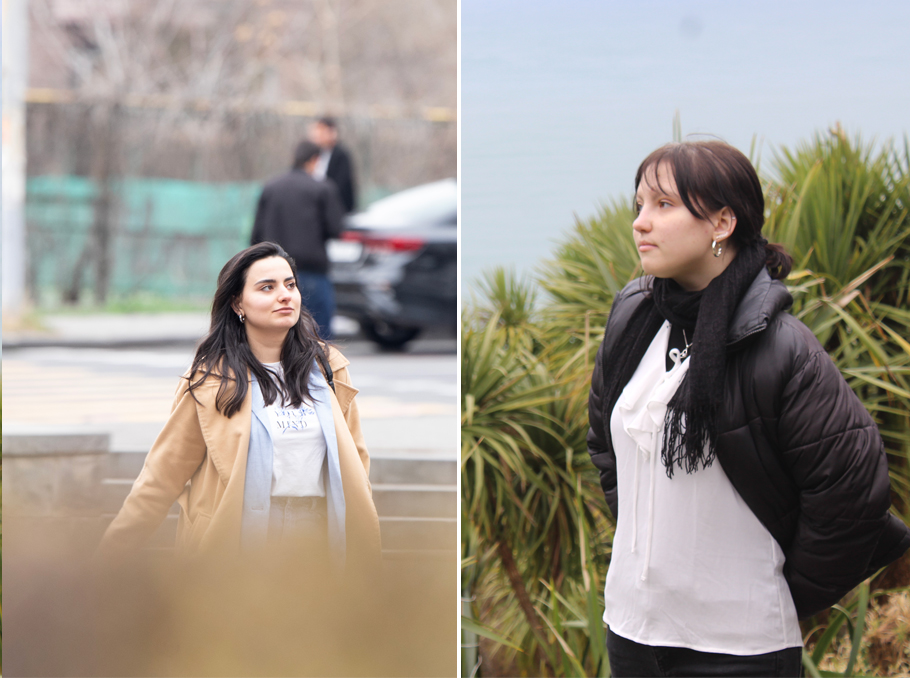

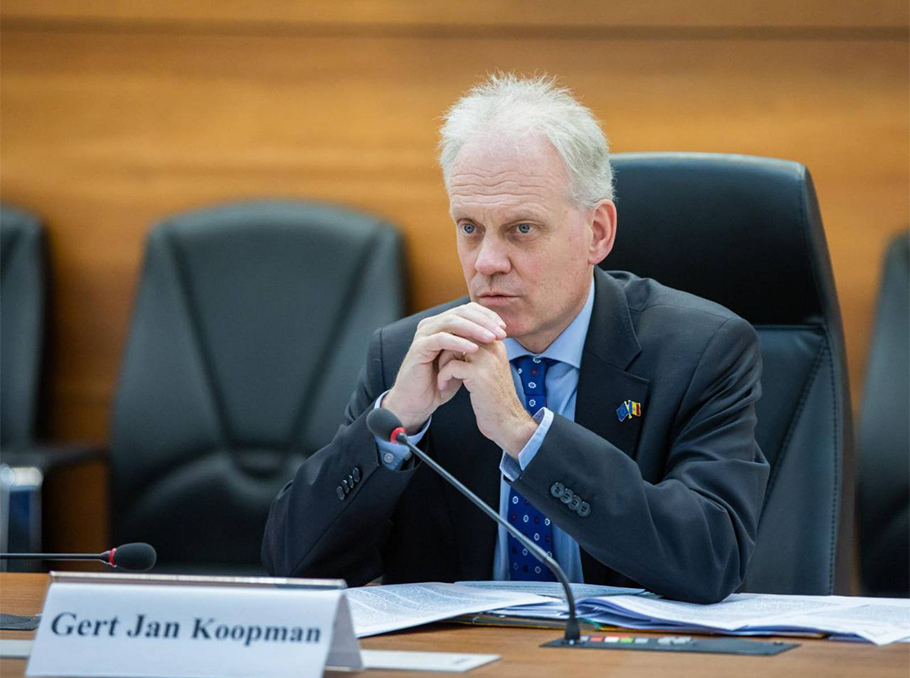
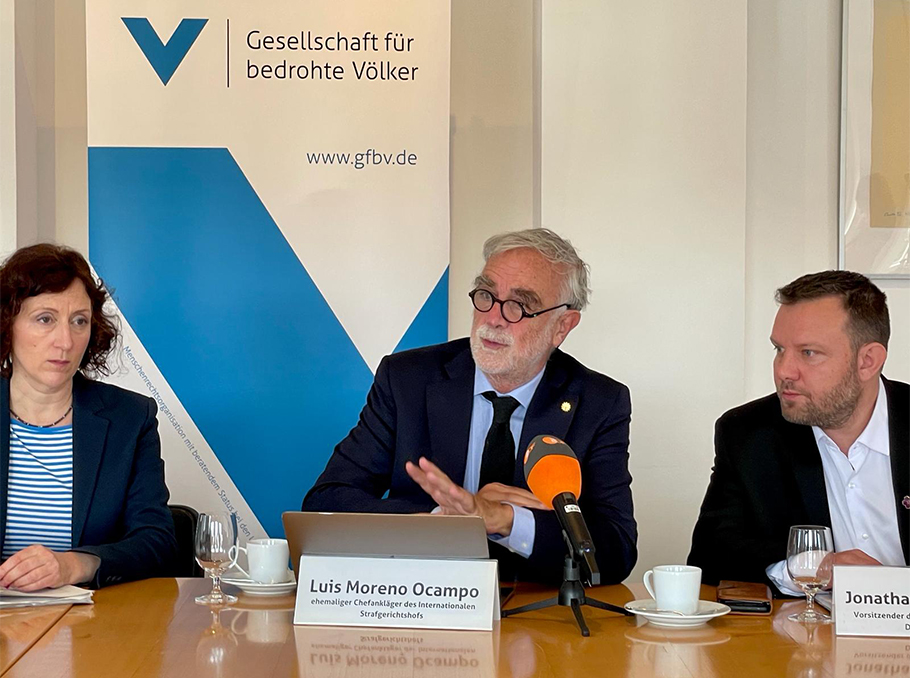
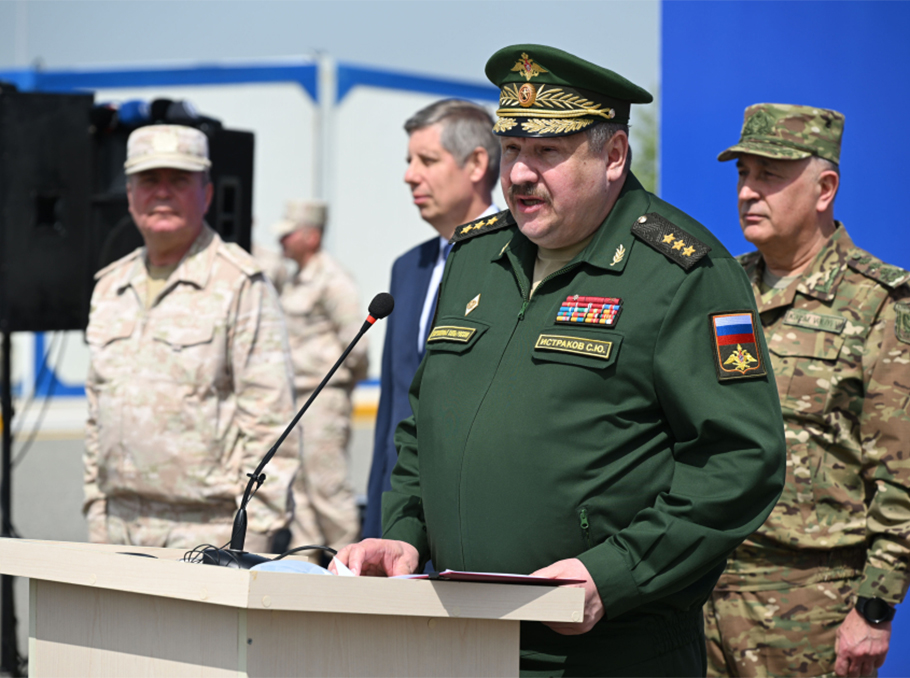





Comments
Dear visitors, You can place your opinion on the material using your Facebook account. Please, be polite and follow our simple rules: you are not allowed to make off - topic comments, place advertisements, use abusive and filthy language. The editorial staff reserves the right to moderate and delete comments in case of breach of the rules.